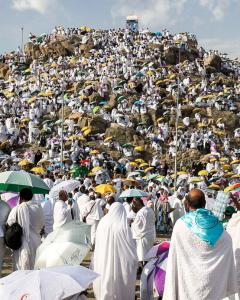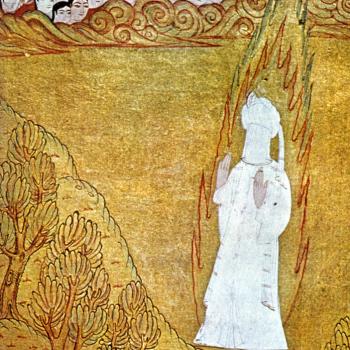
On Monday, the pilgrims marched out in their great multitudes from the plain of Mina outside of Mecca, to Arafat, a small mountain about 8 miles away. Millions of souls heading in the same direction, for the same purpose, calling out in the same way with their collective voices resounding in every direction:
“Labayk Allahumma Labayk, Labayka la Shareeka Laka Labayk. Innal Hamda, Wan Ni’mata laka wal mulk, la Shareeka lak”.
“Here I am O my God, here I am! There is no one equal to You, here I am! All praise is Yours all bounty is Yours, and all sovereignty is Yours. There is no equal to You, Here I am!”
They traveled from the plain of Mina (which means Hope) seeking the heights of Jabalu-r Rahmah (Mountain of Mercy) carrying in their hearts their deepest and dearest hopes for forgiveness.
Every step of the Hajj is meant to bring us to this unique and paradoxical moment. It is indeed remarkable that the entire journey of the Hajj is defined by and culminates with this tremendous procession and standing. It is a movement of millions together towards a common destination, yet it is a totally solitary standing for each soul, alone, in its own inimitable longing, humility and helplessness before the Lord of All the Worlds, humbly seeking His forgiveness.
When we realize this truth about the Hajj, we may come to understand how forgiveness is such a fundamental pillar of the Islamic faith and how it is such a vital aspect of the relationship of unconditional love, of Rahmah, between God and humanity.
To understand the centrality of forgiveness in Islam we can look to the Quran and Traditions of the Prophet (AS) to reflect on the guidance they contain about forgiveness.
In the Quran, Allah’s name the Forgiving (Al Ghafur), is most often paired with the name the Most Merciful (Al Raheem). Al Raheem is the Divine Name of the quality that actively bestows unconditional love and when it is paired with Al Ghafur, this intimates to us that forgiveness is intrinsically related to the experience of unconditional love.
In a unique and decisive verse, Allah commands us to, “Make it known to My servants that I, I am The Forgiving (Al Ghafur), The Most Merciful (Al Raheem)” 15:49. This divine command to the Prophet (AS), and to anyone else who receives the guidance of the Quran, makes it clear that it is our responsibility as human beings, as God’s viceregents (Khalifah) on this earth, to make these two qualities known to our fellow humans. How do we do so? We fulfill this command by manifesting these two qualities in our being. We make people know it when we ourselves become forgiving and merciful.
But we are human, we are prone to forgetfulness and to falling into the traps of our egos. We can find ourselves stuck in arrogance, pride, grudges, resentments, cruel judgments, anger, and the desire to wound others when we ourselves are wounded. How then do we uphold this divine command to make forgiveness and unconditional love known among God’s servants? We can do so by following the example of the Prophet (AS), the one who is sent only as a Mercy to All the Worlds. Let’s look at how the Prophet (AS) understood and accepted the human condition, how he tamed his own ego and how he manifested forgiveness and unconditional love.
In his teachings, the Prophet (AS) made it clear that we are fallible, that we are prone to error, that we are habitually causing harm to ourselves and to others and he freed us of the bondage of guilt and the hopelessness of human expectations by letting us know that this weakness in us is there by Divine Will.
The Prophet (AS) said, “By the One who holds my soul in His hand, if you did not commit sins, God would replace you with others who do sin so that they would seek His forgiveness so that He will forgive them.”
He set our hearts at ease and gave us hope by letting us know that there is nothing that we can do, there is no sin we are capable of committing that is beyond God’s capacity to forgive.
In a sacred tradtion (Hadith Qudsi), he tells us that God says, “O human being! I will forgive without bounds whatever you ask of Me. Even if your sins reach up to the skies and you seek My forgiveness, I will forgive you. Even if you come to Me with enough wrongs to fill this earth, but you have kept your faith in Me, I will meet you with enough forgiveness to fill this earth.”
And he gave us, by his personal example, the guidance we need to be able to bring the qualities of forgiveness and mercy into manifestation.
The Prophet (AS) said, “By God, my heart gets shrouded, and so I seek forgiveness more than 70 times a day.”
Here is practical, actionable guidance on how we can develop our capacity for forgiveness and unconditional love. First, we need to be aware of our inner state, to be conscious of the times when our hearts are covered by darkness. Whenever we become aware of this inner state, we can then use it as a signal to prompt us to turn towards our Lord and seek forgiveness. We keep repeating this as much as possible. The Prophet (AS) tells us that he himself has to do it more than 70 times a day, if he is awake for 16 hours a day this means he is seeking forgiveness at least every 14 minutes or so. We may find we have to do this even more frequently at the beginning. We may find ourselves faltering and failing often as we come face to face with our habitual thoughts and emotions. All of this is alright, we just have to keep seeking over and over again without shame, without guilt, without despair.
Why is seeking forgiveness so important to our faith? It maybe that it keeps us aware of a profound and humbling truth: that we are not the ones who have the power or choice to forgive, we only have the choice to seek forgiveness and it is God who bestows forgiveness upon us. It’s hard to overstate the importance of this truth. If forgiveness were left up to us, we would be doomed to an endless cycle of conflict, revenge, and retaliation. There would be little hope of ever breaking out of this vicious cycle.
The Quran makes this clear to us when it states, “Say: If you were to own the treasuries of my Lord’s Mercy, you would withhold from fear of expending. Truly, the human being gives grudgingly!” 17:100. God’s limitless generosity and love are securely held in His care from whence it can freely flow to His creation. In this, there is safety and security for us from the inflation of our ego. There is a real danger in our thinking, “I will forgive.” And even more danger in thinking, “I will never forgive!”
During the time of the slander against Lady Aisha, her father, Abu Bakr, learned that one of his own relatives was engaging in the vicious gossip about her. This relative was poor and Abu Bakr supported him, so he vowed to cutoff his support in retaliation. When the Prophet learned about this decision, he advised his friend to reconsider, but Abu Bakr was too hurt, and would not change his mind. Then a verse was revealed:
“Let not those among you of virtue and wealth vow not to give to their relatives and the needy and the emigrants in the cause of God. Let them pardon and forebear. Would you not love for God to forgive you? God is Forgiving and Merciful.” 24:22
Upon hearing this verse, Abu Bakr came to the Prophet with tears in his eyes and said, ‘O Messenger of God, I would love God to forgive me.” And he reinstated his support for his relative.
Seeking forgiveness defines our relationship to our Lord, (Rabb), and this, in turn, defines our relationship to one another. If our relationship with God is that of the repentant servant seeking forgiveness, then we will know God as the Merciful and Forgiver. And if we know God in this way, then we will reflect the same qualities in our relationship with His creatures, with our families, friends, and strangers. We will be merciful with ourselves and with others, we will be more forgiving of the wrongs of others. We will be content, and we will joyously submit to God’s Will. We will come to know conscious surrender (Islam).
Seeking forgiveness is the door that leads to the path of maturity and completion of our humanness. It will help us develop noble characteristics such as courage, gentleness, forbearance, honesty, sincerity, and humility. When we seek forgiveness, we bring to the Divine our heavy burdens and we are relieved of them by the Divine’s limitless capacity for forgiveness and mercy and this will determine what kind of human beings we ultimately are to become at the end of our earthly journey. The Prophet (AS) said, “The one who repents and seeks forgiveness is the same as one who has no sins.”















